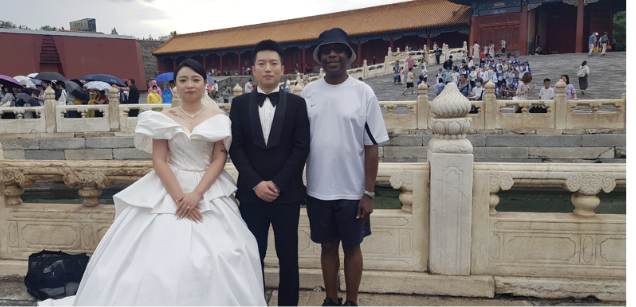Published: October 03,2023
By Gerald Mbanda

A Chinese couple and the author pose for a photo in the Forbidden City. Photo credit: @Jessica Samantha
Last summer I travelled to China with my family and the main purpose of our visit was to attend the graduation ceremony of our son at Shanghai University of International Business and Economics. The family was very anxious to connect with him not because of the excitement of graduation but because he has spent three years without returning home due to COVID-19 travel restrictions.
After graduation we had an opportunity to visit different places in China, thanks to our good friends who helped us to organize a wonderful memorable trip. From Shanghai we travelled to Beijing where we visited among others a historical site known as ‘The Forbidden City.’ It is one of the tourist attractions in Beijing, a former Chinese imperial palace and winter residence of the Emperor of China from the Ming Dynasty to the end of the Qing dynasty, between 1420 and 1924.
The Forbidden City served as the home of Chinese emperors and their households and was the ceremonial and political center of the Chinese government for over 500 years and was constructed from 1406 to 1420.
My story today is not about the history and significance of the Forbidden City. It is about a newlywed young couple that we found walking within the Forbidden City with a cameraman taking their pictures within the Forbidden City which covers over one million square meters. The couple was smartly dressed and beautiful. They were walking comfortably talking and smiling to each other. What struck me most was that they did not have dozens of other young men walking along with them as it usually happens within the set-up of weddings for the African youth.
As I congratulated the couple I got interested to know if they has a motorcade waiting for them outside the Forbidden City. There was none. They came by public means and they would go back the same way. To put it in monetary terms, they would spend less or not more than 20 Yuan (less than 3 US dollars) on transport on their wedding day. When I compared the expense of transport for weddings of young men in African cities the amount runs in hundreds of dollars.
When it comes to wedding receptions of the youth in Africa from affluent families, hundreds of guests are invited ranging from 300 and above. The budget for food, drinks, decoration, entertainment, wedding venue etc, runs in thousands of US dollars. The couple we met had none of such items. They were to meet with a few close friends for dinner at a restaurant. When I talked to some Chinese friends who are already married, I found out that the invited friends can also pay their own bills for the food and drinks plus that of the wedded couple.
A wedding is exciting as it marks the beginning of a new journey of two people living together and hopping to raise a family. The mind set of spending all the savings and probably borrowing from the bank to organize a laving wedding does not seem to be a right decision given the economic conditions and sources of income for the young generation.
Spending much money is not what makes the wedding exciting and memorable. Spending rationally and making priorities for the future makes more sense. Instead of blowing thousands of dollars in one day on a wedding, the young couple can probably spend the money in a mortgage loan so that in a few years’ time, they acquire their own house given the fact that majority of them do not own houses at the time of making a decision to get married.
The experience of stopping large gatherings during COVID-19 showed that it is possible to invite a few friends to the wedding and this does not make the ceremony of less value. Some young people in urban areas have expressed discontent that sometimes their parents are the ones who want to invite many people and they find the wedding ceremony as meant to please their parents than being their own day. Researcher on marriage and family issues also indicates that greater migration of city dwellers especially due to work is part of the reason behind the dying culture of wedding ceremonies among the younger generation.
I have talked to a few young people how I was impressed by the modesty of the Chinese couple I met at The Forbidden City. Probably this also has something to do with the culture of spending wisely. Today, China is home to the largest middle-class in the world comprising more than 50 percent of the population and one would expect this shift to come along with increased spending. In China, there are also some big spenders on weddings too, but the majority have a good habit of being frugal in spending while increasing their savings.
In a survey conducted in 2022, by the People’s Bank of China (PBOC), China’s central bank, it was revealed that almost 60% of people in China are now inclined to save more, rather than consume. There is much more that African and Chinese youth can learn from each other. Probably I have to take along some African youth to China on a study tour to learn among other how they can change their mindset on lavish wedding expenditure and instead embrace the culture of saving more.
Gerald Mbanda is a Researcher and publisher on China and Africa.
For comments or opinion write to us on info@africachinareview.com
 Africa -China Review Africa -China Cooperation and Transformation
Africa -China Review Africa -China Cooperation and Transformation
